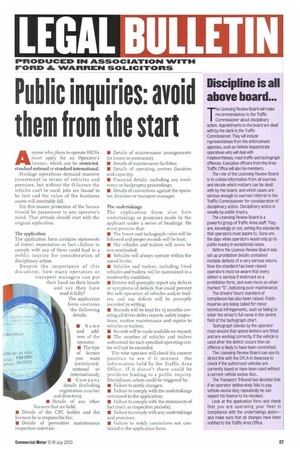PRO aucEri Iffq assoemirrnom virowia Fart° ar. WARRIE111 SCIPLuernaorts
Page 29

If you've noticed an error in this article please click here to report it so we can fix it.
Public inquiries: avoid them from the start
Anyone who plans to operate HGVs must apply for an Operator's Licence, which can be restricted, standard national or standard international.
Haulage operations demand massive investment in terms of vehicles and premises, but without the 0-licence the vehicles can't be used, jobs are bound to be lost and the value of the business assets will inevitably fall.
For this reason protection of the licence should be paramount in any operator's mind. That attitude should start with the original application.
The application The application form contains statements of intent, expectation or fact—failure to comply with any of these could lead to a public inquiry for consideration of disciplinary action.
Despite the importance of this document, how many operators or transport managers can put their hand on their hearts and say they have read it fully?
The application form contains
,:o4s,Nco.r. , . s g:......'-: the following i'•.:.:°t.' .
details:
• Name and address of the operator; IN The type of licence you want (restricted, national or international);
• Company details (including registration number and directors); • Details of any other licences that are held; • Details of the CPC holder and the licences he is responsible for; • Details of preventive maintenance inspection intervals; • Details of maintenance arrangements (in house or contractor); • Details of maintenance facilities; • Details of operating centres (location and capacity); • Financial details, including any insolvency or bankruptcy proceedings; • Details of convictions against the operator, directors or transport manager.
The undertakings The application form also lists undertakings or promises made by the applicant under a series of headings. He must promise that: • The hours and tachograph rules will be followed and proper records will be kept; • His vehicles and trailers will never be run overloaded; • Vehicles will always operate within the speed limits; • Vehicles and trailers, including hired vehicles and trailers, will be maintained in a roadworthy condition; • Drivers will promptly report any defects or symptoms of defects that could prevent the safe operation of vehicles and/or trailers, and any defects will be promptly recorded in writing;
• Records will be kept for 15 months covering all driver defect reports, safety inspections, routine maintenance and repairs to vehicles or trailers;
• Records will be made available on request; • The number of vehicles and trailers authorised for each specified operating centre will not be exceeded.
The wise operator will check his current position to see if it mirrors the information held by the Traffic Area Office. If it doesn't there could be problems leading to a public inquiry. Disciplinary action could be triggered by: • Failure to notify changes; • Failure to comply with the undertakings contained in the application; • Failure to comply with the statements of fact (such as inspection periods); • Failure to comply with any undertakings and promises; • Failure to notify convictions not contained in the application form.




































































































